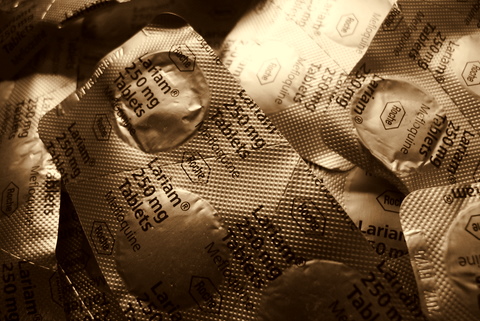Loopy Larium
When do the side effects of a prescription drug outweigh the benefits?
Is it when your vision starts to play tricks on you and shadows shift and vie for attention at the periphery?
Maybe, it’s when stomach cramps leave you feeling that you’ve just eaten a bowl full of giardia?
Or is it when your thought processes become so bogged down in a cognitive pea-souper that it can take twice as long to perform a simple task; that is if you can remember what you’re supposed to be doing?
It could be the constant sensation of itchiness or an all-enveloping physical malaise that starts to ring alarm bells.
A deterioration in motor-coordination skills compounded by chronic insomnia might be the tipping point.
Or is it the fact that your hair starts falling out at an alarming rate that makes you think this really is the last straw?
 And if a much anticipated trip to the National Museum of Ethiopia to say hello to our 3.2m year-old ancestral great-auntie Lucy (or Dinknesh, meaning ‘wonderful’ in Amharic) results in a feeling of evolutionary awe and wonder; does the sight of her dainty fossilised bones pulsating before your very eyes make you realise that it’s time to knock the prescription drug on the head?
And if a much anticipated trip to the National Museum of Ethiopia to say hello to our 3.2m year-old ancestral great-auntie Lucy (or Dinknesh, meaning ‘wonderful’ in Amharic) results in a feeling of evolutionary awe and wonder; does the sight of her dainty fossilised bones pulsating before your very eyes make you realise that it’s time to knock the prescription drug on the head?
This is my personal experience of Larium.
Manufactured by the Swiss-based company Hoffman-La Roche, Larium, or to coin its medical term – mefloquine – is prescribed for the prevention and treatment of malaria. Although, it’s still considered one of the most effective medicines available for those travelling or working in areas where there is a high risk of exposure to malaria, particularly the virulent strain of protozoan parasite – P.Falciparum – prevalent in sub-Sahara Africa, the side effects are far from benign.
The list of ‘possible side-effects’ in the patient leaflet speak for itself:
- Severe allergic reaction (anaphylaxis) with symptoms such as difficulty in breathing, swollen tongue, itching and severe rash
- Fits
- Severe changes in heartbeat, including pounding, racing, skipped beats or palpitations
- Severe changes in texture and appearance of the skin, especially if it affects your mouth and eyes
- Inflammation of the lungs (pneumonitis), which may cause fever or chills, cough, breathlessness and chest pain
- Unusual changes on your mood or behaviour, including: feeling worried or anxious, feeling depressed; feeling that people are against you; crying or wanting to cry for no reason; restlessness; new or worsening feelings of anger (aggression), forgetfulness, agitation, confusion, panic attacks; seeing or hearing things that aren’t really there (hallucinations); feelings that you want to kill yourself.

After taking just two weekly treatments, I won’t be taking a single dose more.
The reason why I’m writing this is to warn any readers who are considering using Larium to think again, or at least explore the alternatives such as Malarone or Doxycycline (and their side-effects), before you decide to take the treatment. Larium is strong psychotropic stuff. Seriously strong. Slowly going loopy on anti-malarials is never an ideal way to explore a country.
2 Comments
catherine
A quick google will show widespread concerns about the side effects of LariAm. I know someone who was seriously affected to the extent of a permanent personality change. see http://www.guardian.co.uk/society/2002/oct/24/health.lifeandhealth
“Lariam (Mefloquine) Side Effects Lawsuits. The most-prescribed malaria drug could produce psychiatric side effects in more than one-quarter of all travelers who take it. Peace Corps volunteers are coming forward saying that over the past 12 years they suffered crippling paranoia, anxiety, hallucinations, memory loss, suicidal behavior and physical ailments from seizures to vision difficulty because of the drug handed out by government doctors to prevent malaria”
beanonabike
Hi Catherine, thanks for posting the link. Evidence suggests that between 1/4 and 2/3s of those who have taken Larium, experience unwanted side-effects. Statistically, one in ten thousand experience severe psychological side effects. It also transpires that the US military prescribes the drug to soldiers deployed overseas. Now there’s a reassuring thought…